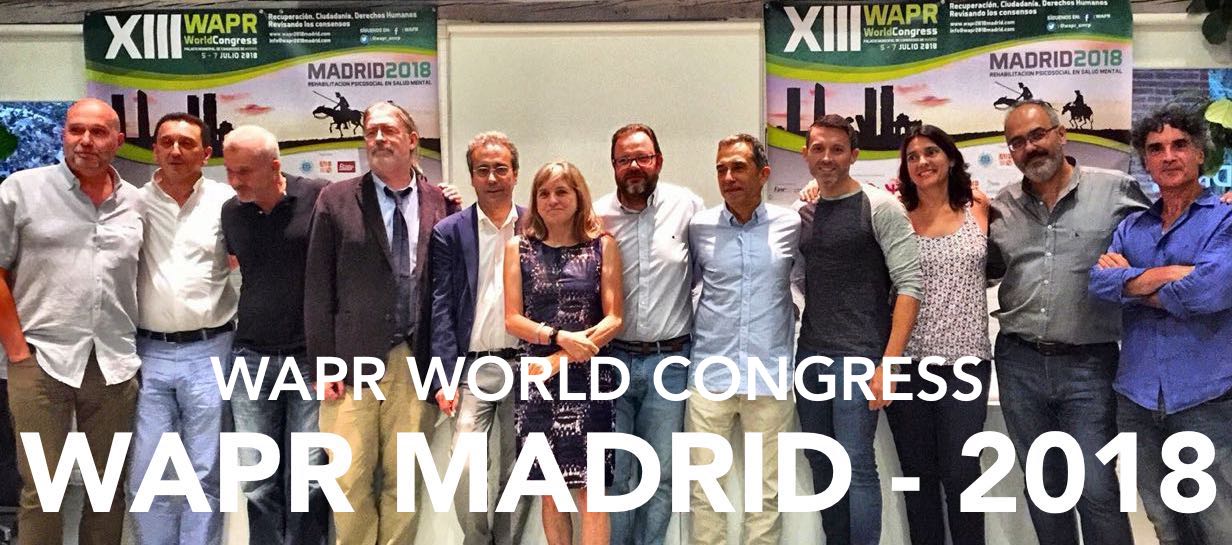2017 has been a very fulfilling year in WAPR. The coming
year 2018 is very close. This will be the year of the WAPR XIII World congress.
This may be a timely opportunity to express some expectancies and wishes for the coming
time in our field.
As many of us think, the attention
to the mentally ill is experiencing a profound change, often characterised as a
change of paradigm. There is an increasing awareness of the importance of
mental health as potential contributor to disability in general population, and
the importance of tackling in the more effective way severe mental health
problems as a way to reduce the burden of suffering and disability. Many ideas
and proposals have been laid on the table in recent years in areas like
prevention, treatment and rehabilitation. But in this opportunity, I will only
mention three, from a very subjective way.
Let us continue understanding the
recovery process from mental illness. Beyond treatment as a way to overcome specific
symptoms, for the people suffering from severe mental illnesses, recovery means
gaining a significative life beyond the residual symptoms treatment cannot
eliminate, disability and possible side effects form treatment. The more we
learn from users’ experience in successful recovery processes, the best we can
use that knowledge in helping new patients in their unique and personal process
to recover. This need of new understanding also includes understanding the
process to getting ill, understanding vulnerability, the role of adverse biographic
events and other traumatic experiences as potential contributor factors to further
development of illness. The best we understand the role all these factors, the
better we will be able to help patients in tackling them. Understanding will
lead to services that better contemplate the extraordinary complexity of getting
sick and also in getting better.
Let us improve accessibility to
mental health services. We are aware that many people in the world has a
limited access to correct psychiatric treatment, even to a very basic and limited
one. As WHO often states –see WHO Atlas database-, in many countries available services
are mostly allocated in mental hospitals, that receive the biggest part of public
budgets in detriment of community services, more accessible and usually friendlier
to people. Improving accessibility entails that policy makers take the
responsibility to create mental health plans –whereas they do not exist- and allocating
the required budget, in order to ensure that the access to services for the
mentally ill is made available in equity basis respect to people with other
health problems, usually better funded that mental health. Community services,
services allocated near the places where people lives, able to provide quality
and continuous services as long as they may be necessary, are the right
strategy to improve accessibility to recovery oriented services for the people
affected by severe mental illnesses. Year 2017 has offered interesting examples
of countries improving dramatically access to mental health services to their
citizens –the case of Peru may be paradigmatic-. Let us expect that 2018 may increase
awareness of the need to improve access to services and offer similar experiences
in other countries.
Let us succeed in reducing coercive
interventions. Coercion and psychiatry have been historically linked for
complex reasons. We now know that mental illness is usually a lasting process
that begins much sooner that when it is recognised. However, since early
signs of mental distress are usually not very specific and are usually
neglected, the onset of mental illness is often dramatic and linked to acute
conflicts that may involve concerns about security of the patient and of third
parties. If we add that madness is an extreme human experience that challenges
understanding, and is usually perceived in a stigmatised way, we can understand
that coercion is linked to psychiatric interventions, and that psychiatry has
received two different tasks- and quite incompatible-: to offer treatment and to guaranty
security. That is why along many years, in many psychiatric services all over
the world, coercion is widely and uncritically accepted as a “normal” part of the practice.
But this perception need readjustment. First, research shows that coercion can be
widely and easily reduced by improving training and changing attitudes on
staff. Second, although it is difficult to deny that security is sometimes a real
concern in practice, it has been proved in different places that a well-trained
and motivated team can tackle most emergencies without using coercive methods.
And third, the perspective of Human Rights, specially that emerging from the
U.N. Convention of Rights of People with Disabilities, obliges to reconsider
the use of coercion in psychiatric interventions as a routine practice wherever
it takes place. Reducing coercion to the minimum -...may it be close to zero?- may be a good challenge for
the new year.
Let us expect the best for the coming
year, and may these three wishes may find their way in it. The WAPR World
Congress Madrid 2018 will gather some of the most interesting experiences in
the world in these topics and will offer training workshops to make those
experiences available to all delegates.
Happy 2018!


No hay comentarios:
Publicar un comentario